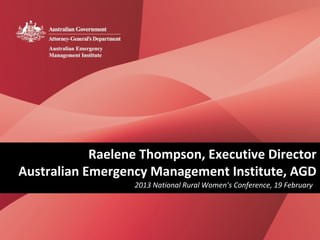
Rt afternoon tea presentation + 1974 footage for national rural womens conference feb 2013
- 1. Raelene Thompson, Executive Director Australian Emergency Management Institute, AGD 2013 National Rural Women’s Conference, 19 February
- 2. National Strategy for Disaster Resilience Council of Australian Governments
- 3. Six key messages 1. Disasters will happen 2. Know your risk 3. Get ready, then act 4. Disaster resilience is everybody’s business 5. Connected communities are resilient communities 6. Learn from experience
- 4. Australian Emergency Management Institute AGD-AEMI supports the delivery of the 6 key messages via: • building national capability • 3,000 participants every year • education & training • seminars • networking
- 5. AEMI products • Nationally-recognised training • Professional development • Workshops & Master Classes • Research & Knowledge Hub • Community awareness & publications
- 7. AEMI: a trip down emergency management memory lane ...
Notas do Editor
- It’s a great honour to participate in the National Rural Women’s Conference, and to be surrounded by so many accomplished women working in rural and regional areas across numerous professional sectors.
- Every year, Australian communities face devastating losses caused by disasters. Bushfires, floods, storms, other hazards and their associated consequences have significant impacts on communities, the economy, infrastructure and the environment. On 7 December 2009 the Council of Australian Governments (COAG) agreed to adopt a whole-of-nation resilience-based approach to disaster management, which recognises that a national, coordinated and cooperative effort is needed to enhance Australia’s capacity to withstand and recover from emergencies and disasters. The National Emergency Management Committee (NEMC) was tasked by COAG to drive and coordinate the development of the National Strategy for Disaster Resilience (the Strategy). A Working Group, consisting of federal, state and territory representatives under the auspices of the NEMC, has developed the Strategy.
- Six key messages
- The Australian Emergency Management Institute (AEMI), based in Mt Macedon, Victoria, is a Centre of Excellence for knowledge and skills development in the national emergency management sector. AEMI opened in 1956 as the Australian Civil Defence School. Since then, AEMI has had a significant role in building the capacity and professionalism of the emergency management sector in Australia. As a part of the Attorney-General’s Department, AEMI provides a range of education, training, professional development, information, research and community awareness services to the nation and our region. Each year about 3,000 emergency management participants benefit from AEMI’s services – f ive years ago approx. 33% of AEMI attendees were women and currently that figure has increased to approx. 38%
- AEMI courses cover a wide range of emergency management areas like: emergency risk assessment, managing a recovery centre, business continuity management and others. Another strength of AEMI’s work is our Community Awareness program. One of these projects is the Resilient Australia Awards, which are sponsored by the Attorney-General’s Department. The awards recognise innovative practices and achievements across the nation that are making our communities safer, stronger, more resilient and better prepared to manage any emergency situation.
- In Australia, when disaster situations arise at a local level, as a developed country we have the luxury of being able to rely upon an excellent network of 500,000 trained volunteers via numerous well-resourced agencies like: State Emergency Services Country Fire Authority Australian Red Cross and others We know that with AEMI’s recent Volunteer Leadership Program t he representation of women in was over one third, which is substantially better than their representation among emergency management volunteers as a whole, and is a great benefit to the program and a substantial contributor to its success.
- Let me end here on a lighter note and share with you some historical AEMI footage from 1974 when AEMI was known as the Australian Civil Defence School run by the Department of Defence. The intention was to encourage females to take on greater roles in emergency management.